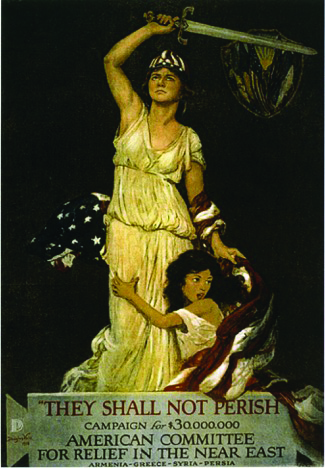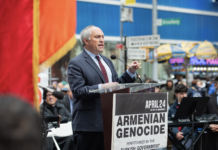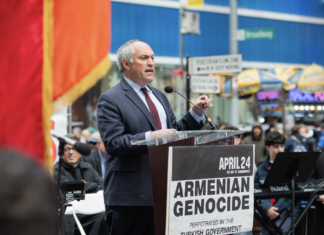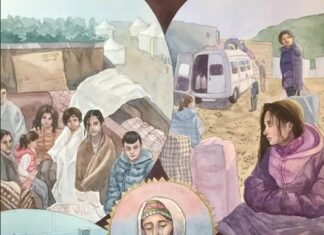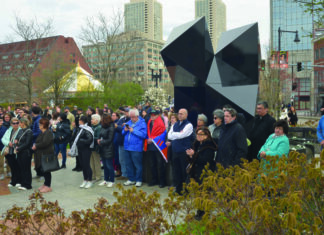By Aram Arkun
Mirror-Spectator Staff
NEWTON, Mass. — By now there are a good number of documentaries on the Armenian Genocide, but as good as some of the older ones are, with the passage of time, they begin to appear dated. New documentaries have the challenge of providing us with a fresh new look at historical events which still impact our lives. The nonprofit educational organization Facing History and Ourselves screened one such film called “They Shall Not Perish: The Story of Near East Relief,” on the evening of February 16 to a small group of Armenian community leaders at the West Newton Cinema. This new documentary on the Armenian Genocide focuses on the role played by Near East Relief (NER), an important American philanthropic association. Award-winning producer, writer and director George Billard, and Near East Foundation (the successor organization to NER) board member Shant Mardirossian, the executive producer of the film, spoke at the event.
Roger Brooks, the president and chief executive officer of Facing History and Ourselves, began the evening by pointing out that his organization has been teaching the lessons of the Armenian Genocide for forty years now, and has always sought a way to make this topic accessible to high school and junior high school students, so that they choose to behave in ways that will create a future we would all want to live in. He said that he hoped that millions of students would be reached through this new film.
The film was then shown. Approximately 53 minutes in length, it had to convey information about Armenians, the Ottoman Empire, genocide and American philanthropy in an abbreviated fashion. It used a series of actors with familiar voices as narrators, headed by Victor Garber, costar of Ben Affleck’s Academy Award nominated film “Argo,” with six Emmy Award nominations for television roles, and four Tony nominations. Others include Tony Shalhoub, an award-winning character actor in many films and most notably the star and producer of the TV series “Monk,” Ron Rifkin, who has played a wide variety of roles on stage, television (e.g. “Gotham,” “Alias,” “Limitless,” and “Law and Order”) and film, the well-known Armenian-American actress and comedian Andrea Martin, and Kathleen Chalfant, Michael Aronov, Dariush Kashani, and Kara Vedder.
A number of academics were featured as commentators, including Peter Balakian, a professor at Colgate University who has penned several books of prose on the topic, including The Burning Tigris: Armenian Genocide and America’s Response, the memoir Black Dog of Fate, and the translation of Krikoris Balakian’s Armenian Golgotha, as well as works of poetry. Professor Keith David Watenpaugh, director of the University of California Davis Human Rights Studies Program, and author of Bread from Stones: The Middle East and the Making of Modern Humanitarianism, is another. Professor John Milton Cooper, Jr., spoke as a historian focusing on the era of World War I and a biographer of US President Woodrow Wilson. He retired from the University of Wisconsin-Madison as the E. Gordon Fox Professor of American Institutions.
A non-academic dentist, Dr. Hagop Martin Deranian, spoke movingly about American philanthropy. Son of a mother who survived the Armenian Genocide in part due to aid from Dr. Jacob Kunzler, Deranian wrote President Calvin Coolidge and the Armenian Orphan Rug about Near East Relief orphans, as well as other books on modern Armenian history.



